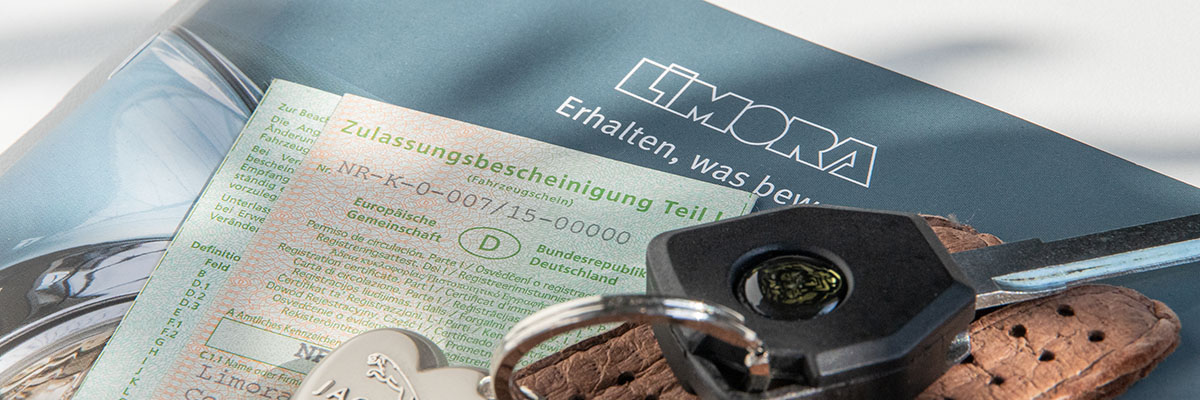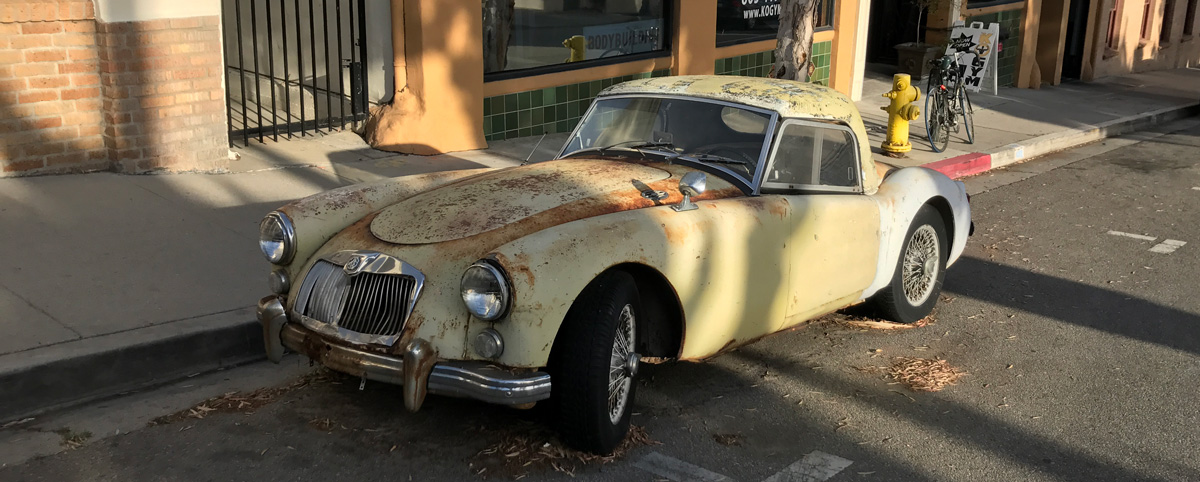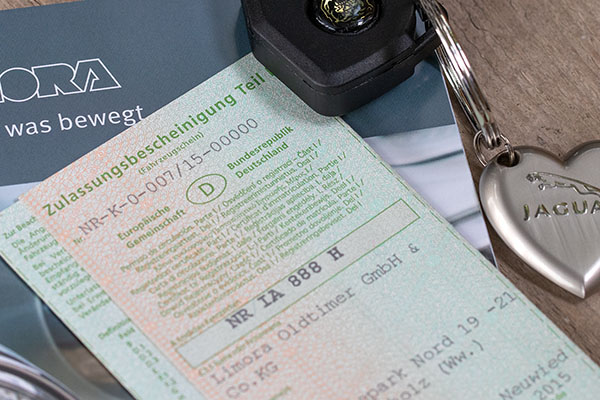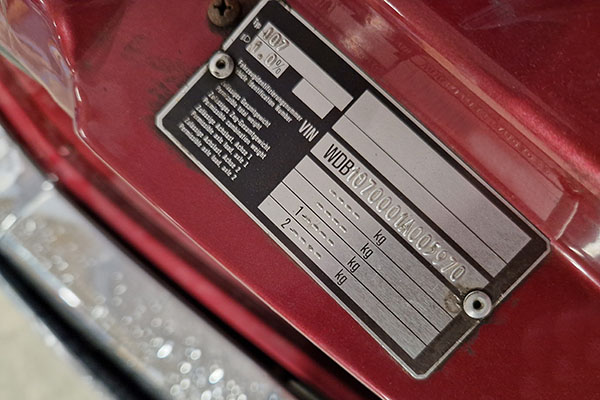Applying for a new vehicle registration certificate and registering a classic car without papers
Especially with classic cars, it can often be the case that important papers such as the vehicle registration certificate, the purchase contract or the registration certificate part II can no longer be found. If you want to register a classic car without papers, you often face a problem in the form of the goodwill of the registration offices. However, it is possible to register a vehicle without papers. How to proceed and which documents you need, you can find out here from the professionals at Limora.

Posição: Venda
Atualizado: 20.10.2023

No vehicle documents available and classic car registrations: Basics
Let's start with the basic facts about the vehicle registration document: In Germany, the vehicle registration document defines the owner of a car. Whoever holds it in their hands legally owns the vehicle. Furthermore, without this document you can very well buy or sell a car, but you can neither deregister nor re-register it. Only the seller as the registered keeper can, for example, re-apply for a lost vehicle registration document.
In 2005, the vehicle registration certificate became the registration certificate part I, and the vehicle title became the registration certificate part II. The vehicle registration certificate and the vehicle title are two documents that are very important and together form the registration certificate.
An old vehicle registration certificate remains valid. But if the vehicle registration certificate is lost or stolen, it must be replaced by a new registration certificate Part II. And this is not uncommon, especially with classic cars! Unfortunately, these documents often get lost over time. This often involves so-called barn finds, i.e. vehicles that have been parked in cellars and garages for decades and were forgotten.
What is particularly exhausting about classic cars without papers is that almost every registration office has its own procedure. This means that although registration without papers is possible in theory, in practice it often fails because of the authorities and their procedures.
Contact the registration office or district administration office responsible for your district in a friendly manner and without pressure at an early stage. Be honest about the problem. They will usually help you in a friendly and competent manner. We have often had this experience. If it doesn't work out at all, a friend or acquaintance can ask their local authority. You will always find a way.
Vintage cars without papers: not a rarity
Particularly in the case of classic cars that are more than 30 years old, it often happens that the vehicle documents are lost or can no longer be found. And even if about everyone advises against buying a classic car without papers: Once you have found your dream car, it is more than difficult to make the "right" decision.
Especially when you want to register a barn find, the joy over the treasure quickly evaporates
when you realise what bureaucratic gauntlet some registration offices demand of you. For the regulation of the registration ordinance simply reads as follows: "If [the registration
certificate Part II] is not (yet) available, an application must
be made under §12 for it to be issued." However,
the practice is more elaborate. The registration offices must prevent duplicate registrations and ensure that the files are clear. There have already been cases where a German registration was obtained but the vehicle was still registered in another country. Therefore, the following applies to registration:
- Clarified ownership must be proven. This often includes the previous approvals.
- The sufficient technical condition of the vehicle must be proven.
Within the scope of this application for a registration certificate part II, the right to dispose of the vehicle must now be proven in another way. For example, a contract of sale for the vehicle, foreign documents (e.g. US title), original invoices or customs receipts may be suitable for this purpose. In other words, proof is needed that the vehicle is not stolen or misappropriated.
Especially when importing a classic car all papers should be available. Because without them, the import can be very lengthy. As a rule, the importer's affidavits of loss are not recognised in such cases. Unfortunately, you have to rely on the goodwill of the registration office again.

What documents are needed to reapply for the vehicle registration certificate?
It is very important to distinguish whether you have had the vehicle registration document before, i.e. whether you have misplaced or lost it, or whether it is a vehicle for which there have never been any German papers.
Before we tell you the specific procedure for registering a vehicle without papers, we will first list which papers you should bring with you when you go to the registration office, assuming that the vehicle already had German papers:
- Affidavit on the loss of the vehicle registration document
- Identity card or passport of the vehicle owner
- Registration certificate Part I (if still available)
- Useful: proof of ownership for the car (contract)
- The last TÜV certificate showing the validity of the main inspection. If the car has been deregistered, this document can be omitted. For re-registration, however, the certificate of a valid main inspection is again mandatory.
Do not assume that such a complex process can be completed in one visit to the registration office. The documents to be submitted differ from case to case. You will make it easier for yourself if you present the case and ask the office to evaluate the documents. You will then be given a routing slip and told exactly which documents you need to submit for registration, re-registration, first registration, etc.
Registering a vehicle without papers: what to do
The theft of the vehicle registration document must be reported to the responsible registration office as well as to the police. If the vehicle registration document has been lost or can no longer be found and you apply for a new one, the registration office requires an affidavit of loss. If the document was stolen, the theft must be reported to a police station. So far so good. But what exactly do you do if you want to register your classic car without papers?
If you want to register a vehicle for which there has been no German registration and you have no papers, the same applies as described above, but with the addition of the problems of unclear existence (former registrations) and unclear history.
This is not easy: ownership cannot be acquired in stolen property. So if you pull a car out of the bushes in good faith without papers, or even buy it for small money and restore it, the owner could turn up and reclaim his property from your possession. This happens more often than one would like to assume.
When selling a vehicle without papers: After restoration and passing the general inspection, the buyer can go to the registration office with the purchase contract, which serves as proof of ownership. The purchase contract should ideally contain the following declaration, which should have been agreed with the seller in advance, i.e. before the purchase:
"The seller (name, address) declares on oath to be the unrestricted owner of the vehicle (make, year of manufacture, chassis number)".
As a rule, the chassis number is then called up and published for a limited period in the traffic bulletin. In this way, possible legal claims of third parties to the vehicle can be asserted or excluded. A waiting period of 6-8 weeks should be allowed for. After the end of the appeal, a new registration certificate will be issued, provided there are no legal claims.
If the registration authority refuses to issue a new vehicle registration certificate, you should in any case consider a written notice of refusal. You can then appeal against this decision before the administrative court. In most cases, it is you and not the registration office who will be upheld. But even then, admission is not necessarily granted. The confrontational approach is not expedient.
Applying for a new vehicle registration certificate: Costs
Depending on the city or municipality, the costs for issuing a new vehicle registration document can vary. On average, you will need about 20-60 euros for the new vehicle registration document and 10 euros for the vehicle registration certificate, making a total of 30-70 euros.

When is it necessary to be particularly careful if no vehicle documents are available?
First things first: any vehicle without registration and papers can potentially be a stolen vehicle. Because even if it has not been reported as stolen, then that does not mean that it will not be reported as such in the future. As said above, ownership cannot be obtained from stolen property.
In the Netherlands, new documents are issued very quickly by the authorities. Vehicle thieves know this and use this channel to obtain new identities for stolen vehicles. When the vehicle comes back to Germany, it is still considered stolen and must be returned to the rightful owner.
The Federal Motor Transport Authority (KBA) keeps documents
and data on vehicles for a period of 7 years after the last
registration. The regional registration offices often keep their data
for considerably longer. Simply call the registration office or go there
with a photo of the chassis number. Asking for the chassis number of the vehicle you want to buy costs nothing and gives a certain security.
What is often done when registering a car without papers is to request a so-called straw man as the seller. If you plan to use a friend as the seller in the absence of a purchase contract, this involves great risks. Because if it turns out that the vehicle was stolen once within the last decades, the rightful owners could file legal claims against your friend. A charge of fraud is also possible. So for the sake of friendship, don't do it.
